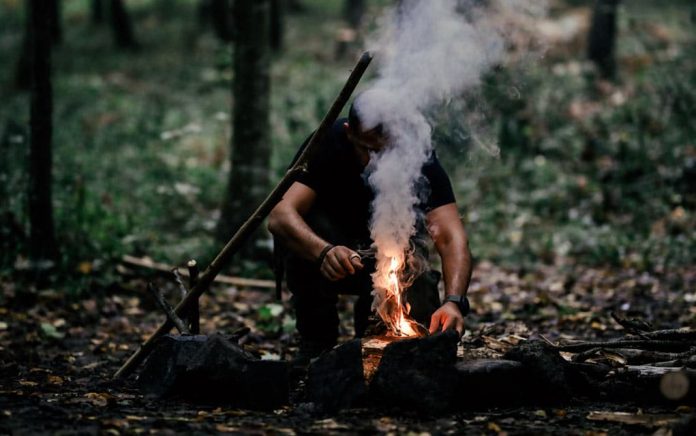
Let’s be honest, the idea of starving to death is horrifying. It’s perhaps one of the biggest fears among preppers, outdoor enthusiasts, and frequent travelers. The threat of becoming stranded or stuck in an emergency situation is scary enough without having to worry about where your next meal will come from.
This isn’t just about being in a survival situation, though. Hunger and starvation are very serious problems in the world. About 9 million people die every year due to hunger-related diseases. These are the harsh realities of starvation.
Starvation and the Body
Starvation can be described as a lack of energy or calories over a prolonged period of time, eventually resulting in the body essentially eating itself. The longer you go without proper nutrition, the more your body will use reserve resources, eventually leading to weight loss and the body will wither and eventually die.
Starvation usually starts with undernourishment, meaning the body is using more calories and energy than can be replenished. You can offset starvation by eating some unconventional foods such as grass, rodents, and insects. If malnutrition persists for weeks and months, it can lead to some serious diseases like anemia and beriberi.
The Process
There’s no question that starvation has harmful effects on the body, but what exactly happens to your body during the process? The actual number of days a person can go without food varies from person to person. The average person can go 30-34 days without food while only experiencing small symptoms of starvation if properly hydrated. At 35-40 days you’ll start to feel the serious symptoms of starvation with death occurring at 45-61 days.
Your body feeds on carbohydrates, fats, and eventually proteins. The first day without food isn’t terrible; not much different than going throughout the night without food until breakfast. After just a few days without food, the body starts to fight back, feeding on reserves.
Eventually, your metabolism also starts to slow down. Your body loses the ability to control its temperature, kidney function becomes impaired, and your immune system becomes weaker. When the body begins consuming its reserves, it can no longer supply nutrients to vital and reproductive organs. They begin to shrink, as do muscles, which may make you feel cold and irritable. One’s ability to focus diminishes.
When there are no carbs or fats for the body to feed off of, it will then look to muscles and protein. When your body starts to feed on your muscle, death isn’t far away. This is because as your body consumes the protein in your muscles and breaks them down, it’s also breaking your heart down.
Obviously, once your heart muscle breaks down, they’ll become weak, and eventually, your heart will stop. People in the late stages of starvation may see hallucinations, experience involuntary muscle movement, and irregular heartbeat, eventually leading to their demise.
Hidden Enemy
If you’re starving you’re probably going to eat whatever you can. This can also prove to be troublesome. While eating is required and having a balanced diet is likely impossible when you’re desperate, you have to be careful with what you eat.
This is especially true if your body has already begun to feed off of the proteins in your body. Proteins are the last reserve to be consumed, which makes it dangerous even if you find food.
Say you’ve entered the phase in which protein is being consumed, and you somehow manage to kill a rabbit. It probably sounds like a lifesaver, but don’t be fooled; it can also prove it to be deadly. If your body has started eating its own protein, you don’t have any fats or carbs left; if you do there is very little.
Consuming more protein could lead to protein poisoning, which usually occurs if the body takes in more protein than fats and carbs over a period of time. If your body has started to feed on its protein it’s pretty likely you haven’t consumed any fats or carbs, so ingesting more protein is not a good idea.
Your protein intake should be between 10% and 35% of your daily intake of calories. If you’ve been starving for an extended amount of time and eat a rabbit, or even insects, your intake percentage will be 100% protein.
The liver and kidneys play an important role in metabolizing proteins, so, if you’re starving, those organs are already at a disadvantage. They can’t properly deal with the proteins you consume, which will result in an increased level of urea, ammonia, and amino acids in the blood. Death from protein poisoning is rare, but that chance goes up if you’re starving.
Because of the increased levels of urea, amino acids, and ammonia in your blood you may experience:
- Nausea
- Headache
- Mood changes
- Weakness
- Fatigue
- Low blood pressure
- Diarrhea
- Slow heart rate
Protein poisoning is easily solved if you have the means. You simply just have to eat more carbs and fats, which chances are you don’t have access to these if you’re in a starvation situation.
The Takeaway
Luckily, you can last a pretty decent amount of time before you wither away, so it’s recommended you use that time wisely. Look for sources of food before you get too hungry to think and concentrate. Stay hydrated the best you can to increase your odds of surviving. Do your best to have an emergency supply of food if you’re traveling, though this is easier said than done.
While most of us can’t imagine going more than a day without food, people all over the world do it every day.
Did you know starvation could be so devastating to the body, or that the types of food you eat in a survival situation were so vital? Reply to your email and let us know, we would love to hear from you!
Copyright 2021, TheSurvivalGuide.com














